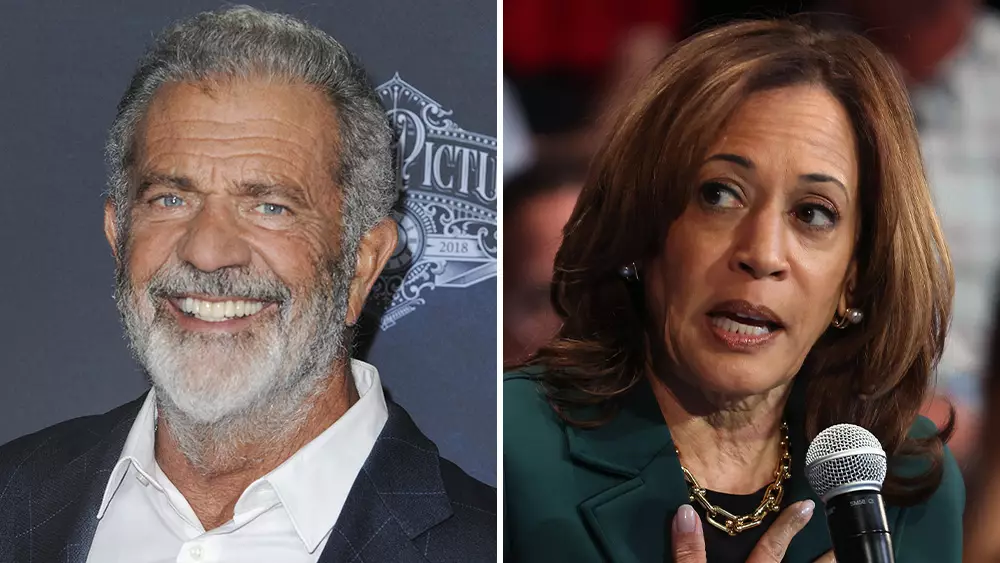Mel Gibson holds a complex position in Hollywood, not merely as a filmmaker and actor but as a figure embroiled in controversy. Recently, he was lauded by Andrew Garfield, his “Hacksaw Ridge” actor, who highlighted Gibson’s personal growth and healing over the years. However, following Gibson’s recent disparaging comments about Vice President Kamala Harris, the legitimacy of Garfield’s praise comes under scrutiny. The remarks made by Gibson at LAX, where he remarked that Harris has the “IQ of a fence post” and expressed his desire for Donald Trump to reclaim the presidency, reveal a troubling inconsistency in his character development narrative.
Gibson’s comments are a continuation of a troubling trend characterized by inflammatory and derogatory assertions against both individuals and communities. By echoing similar criticisms previously voiced by Trump, Gibson appears less to be healing and more aligned with hostile rhetoric that seems to perpetuate division rather than healing.
The implications of Gibson’s disparaging remarks are not to be taken lightly. In today’s polarized political environment, hostile comments can reverberate through the echo chamber of social media, influencing public opinion and perpetuating harmful stereotypes. Gibson’s derogatory claims about Harris mirror unverified attacks by Trump, who has previously labeled the Vice President as “not smart” and likened her responses to those of individuals from “loony bins.” Such phrases not only demean Harris but also contribute to a broader culture of misogyny and disrespect within political discourse.
At the core of these comments lies a critique not just of the Vice President, but of the broader political landscape and the increasing normalization of vitriolic speech. While artistic freedom should be encouraged, it should not excuse behaviors that advocate for harmful stereotypes and create divisive narratives.
Gibson’s journey through Hollywood has been fraught with incidents that highlight his problematic past. From his notorious DUI arrest in 2006—where his antisemitic remarks surfaced—to his 2011 conviction for battery against his ex-girlfriend Oksana Grigorieva, a cycle of abusive language and behavior has followed him for years. His history is a litany of offensive and derogatory comments, often laced with cultural and racial insensitivity, including a history of casual racism and violence.
That the filmmaker continues to express such unpopular and discriminatory views raises questions about the supposed “healing” Garfield spoke of. How can consistent derogatory remarks, sexist undertones, and a propensity for vitriol coalesce with a narrative of personal growth?
The reverberations of Gibson’s comments and behavior extend far beyond personal accountability. In Hollywood, there has been an ongoing dialogue about the importance of condemning figures that practice hate speech, even if their artistic contributions are significant. This dialogue underscores critical conversations concerning racial equity, feminism, and sensitivity in representation. There is a palpable urgency to ensure that Hollywood supports voices that break the cycles of discrimination rather than enabling those who perpetuate them.
The tendency to overlook malign behaviors due to prior artistic success creates a troubling precedent. The entertainment industry must reflect on the values it promotes and the figures it celebrates. Are they champions of healing, or merely entertainers cloaked in charisma while advocating harmful and divisive narratives?
In assessing Mel Gibson’s controversial legacy, we see a man with undeniable talent but equally undeniable flaws and a history of conflict. Andrew Garfield’s supportive comments may momentarily shine a positive light on Gibson; however, they stand at odds with the filmmaker’s continued engagement in derogatory discourse. As society evolves, it is crucial that public figures — especially those in influential positions — reflect and adapt to the progressive values that promote equality and respect. Only through confrontation and discussion of such troubling behaviors can there be hope for real healing and unity.

